Why We Chose Cherokee Classical Academy: Reclaiming Responsibility for Our Kids' Future
Our Sons started at Cherokee Classical Academy this year, what three months has taught us
Over the last few years, “where our kids should attend school” has been an ongoing conversation between Joe and I. While we loved Arnold Mill Elementary School—the teachers, administration, and support staff were excellent—we recognized that even good local schools operate within a larger system facing significant challenges.
In August 2025, my husband and I enrolled both our boys at Cherokee Classical Academy, the new tuition-free public charter school that opened in Cherokee County, after they were accepted via the lottery system. After years at Arnold Mill watching technology gradually replace teaching and kids routinely walking around with cell phones, we made the jump to classical education.
Three months in, the difference is remarkable.
Prior to reading this post, you may want to read an article from Modern Age that focuses on Classical Education:
THE CASE FOR CLASSICAL EDUCATION
Kevin Roberts, former president of Wyoming Catholic College, argues that classical education isn’t just an alternative—it’s essential for America’s renewal. His article presents what our family has been moving toward: an education focused on forming good people who can think clearly, think critically, and not be solely focused on producing good test scores.
Ten years ago, Roberts rejected federal student loan programs at Wyoming Catholic College to defend classical education from government strings. Today, classical education is “ascendant, popular, and on the verge of becoming mainstream.” America’s service academies and the University of Texas now accept the Classical Learning Test (CLT).
Roberts writes that classical education “restores a true anthropology—a true vision of the human person.” Modern schools often treat students like “data points” or “human capital” (aka student cattle). Classical education sees each child as capable of virtue and worthy of a real education.
The goal is “not merely to produce good students but to cultivate students who are good.” Character over performance. Wisdom over information. Formation over indoctrination.
THE DATA BACKS IT UP
According to Arcadia Education, classical school enrollment hit 677,500 students across 1,551 schools in 2023-2024. By 2035, that number will reach 1.4 million. Classical schools doubled between 2019 and 2023. Post-COVID, enrollment surged as parents saw what was actually happening in public education.
In Texas, classical charter enrollment increased nearly sevenfold between 2011 and 2021. Parents aren’t just choosing alternatives—they’re specifically choosing classical education.
Why? Because classical education delivers outcomes that matter to parents. Research consistently shows classical school students excel in verbal reasoning, critical thinking, and reading comprehension—direct results of rigorous reading and writing combined with Latin instruction.
But classical schools achieve these results without “teaching to the test.” They immerse students in Western civilization—Aristotle, Augustine, Aquinas, the American Founders—and academic outcomes take care of themselves. The focus is on forming thinking, articulate individuals who can read deeply, write clearly, and speak confidently.
OUR PUBLIC SCHOOL EXPERIENCE
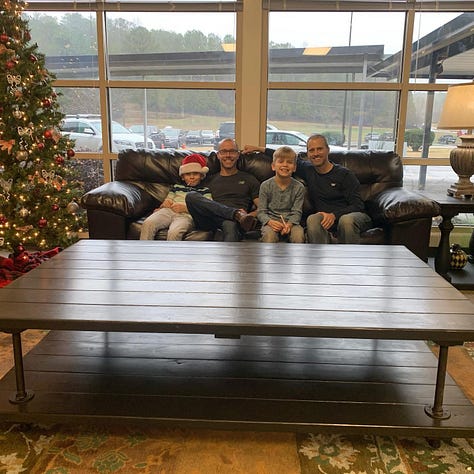
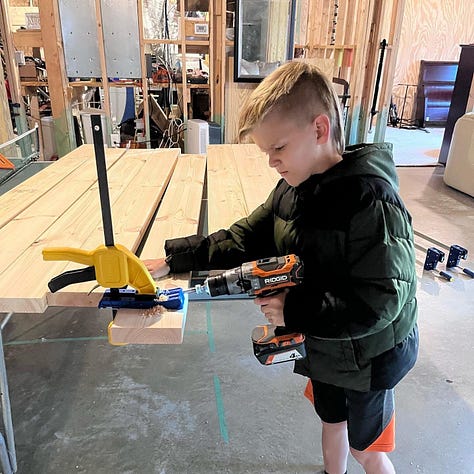
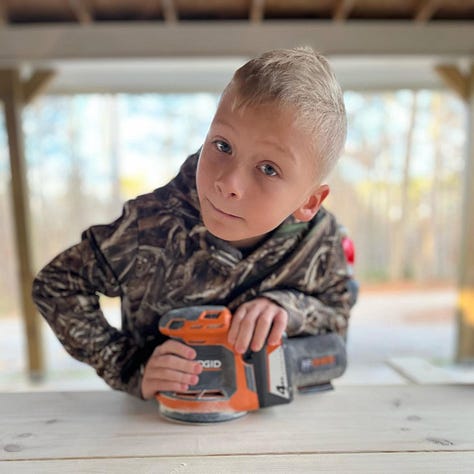
We didn’t leave the Cherokee County School District (CCSD) on a whim. We’d invested years at Arnold Mill Elementary. We built a coffee table for the main office. We showed up. We engaged with excellent teachers and staff who cared deeply about our kids, our family, and their education. But over time, systemic issues became impossible to ignore—issues driven by larger, government mandates, not local decisions.
Technology Replaced Teaching: I recently wrote about our discovery during last school year that teachers weren’t selecting all quiz questions in Canvas (CCSD’s main learning application). Some questions were automatically pulled from a State database, and when my kids answered correctly, they were marked wrong. The teacher we spoke too didn’t even know it was happening until we logged into our son’s Canvas profile, located it, and pointed it out.
COVID Revealed the Dependency on Screens: Remote learning exposed how much instruction had become content delivery via screens. We homeschooled in the later part of that period—my husband’s a former teacher—and saw how much more our kids could learn with actual personalized attention versus “personalized learning platforms.” Our kids are both active boys and both have ADHD. Having a curriculum that includes lots of screen time is NOT ever going to be beneficial for their learning.
Excerpts, Not Books: The reading curriculum in CCSD, like most public schools, is moving towards using excerpts and passages, and not reading complete books. This is partly due to standardized testing requirements and partly due to time constraints in the curriculum. But kids miss out on the experience of reading an entire work, understanding how stories develop, building reading stamina, and reading to understand the virtues, or lack their of, in the characters presented in an entire book.
Behavior Management Challenges: One of the most frustrating aspects of public school was watching classroom learning disrupted by behavioral issues that were not effectively addressed. Public schools operate under constant fear of parent liability and legal action. Unless a student poses a massive, documented threat, expulsion is nearly impossible. Teachers spend enormous time and energy managing disruptive and disrespectful behavior rather than teaching. Public Schools have been legislated to be parents, police, therapists, and teachers thanks to initiatives like “No Child Left Behind.” Great marketing, bad policy.
WHAT WE’RE SEEING: THREE MONTHS IN
Cherokee Classical Academy opened in August 2025 as part of the Liberty Classical Schools network, serving grades K-6 with plans to add a grade yearly until reaching K-12. It’s tuition-free—we’re not paying private school tuition- but we have the educational approach we wanted.
Here’s what we’ve observed in our boys after just three months:
Vocabulary Expansion: My kids are using words I didn’t expect to hear this early. They’re not learning vocabulary lists in isolation—they’re encountering rich language in context through great literature. At Cherokee Classical, they’re reading entire books, like The Secret Garden, with complex language in 5th grade, and it shows.
Public Speaking Confidence: Students regularly present to their entire class. They recite memorized poetry, like The Raven. My boys came home nervous about this at first. Now they ask to practice their presentations for us. This wasn’t part of the CCSD curriculum in early elementary—maybe a show-and-tell here and there, but nothing systematic about standing up and speaking clearly to an audience.
Reading Complete Books: At Arnold Mill, reading instruction began relying heavily on excerpts and passages. Short stories. Chapters pulled from longer works. Digital reading passages on screens. At Cherokee Classical, my boys are reading entire books—real literature, not textbooks. The Lion, the Witch and the Wardrobe. Charlotte’s Web. The Secret Garden. Complete works they can discuss from beginning to end and write summaries on each chapter with paper and pencil. They understand narrative arc, character development, and theme because they’re experiencing complete stories, not fragments.
Minimal Screen Time: THE BIGGEST difference is how little technology is involved. No Canvas. No Email. No “educational computer games.” No automated quizzes. No tablets for “personalized learning.” Paper, pencils, real books. Teachers teaching. Kids learning. The difference in focus and engagement is night and day compared to the screen-heavy approach in the public school systems.
Daily Accountability: Every day, they bring home an agenda that teachers sign, we review, sign, and return. We know exactly what they’re learning, what homework they have, and how they’re performing. We’re genuine partners with the school, not passive consumers hoping for the best.
Clear Behavioral Expectations: At Cherokee Classical, there are clear expectations, consistent consequences, and genuine partnership with parents regarding behavior. If a student repeatedly disrupts learning or disrespects teachers, the school addresses it directly with parents. If the behavior continues and the family isn’t working with the school to fix it, that student may need to find a different school. It sounds harsh, but the result is classrooms where teachers can actually teach and kids can actually learn. The culture emphasizes respect—for teachers, for other students, for the material studied. There are consequences for not meeting expectations. This prepares them for reality. Life has consequences.
What’s also striking is how orderly the classrooms and hallways are since students do not change classes/teachers in between core subjects. My boys come home and talk about what they learned, not about which kid was acting out or disrupting class or in the hallway.
Virtue-Based Learning: The school explicitly teaches character. Courage, temperance, justice, wisdom. Not as abstract concepts, but as practical habits to develop. They’re learning that being good matters as much as being smart.
THE GROWTH TRAJECTORY
Parents nationwide are choosing classical education. Christian based classical schools grew from 140 in 2010 to over 700 by June 2023. A January 2024 survey found 72% of parents considered a new school, 63% searched, and 44% chose a new school. Cherokee Classical Academy is not a religious based classical school, but religious history, such as the history of the Jewish people, is already being taught to my 6th grader.
By 2035, Arcadia Education forecasts 1.4 million students in classical schools—over 522,000 in homeschool co-ops and online schools, 300,000 in Christian classical schools, nearly 148,000 in classical charters (like ours), plus hundreds of thousands more across expanding options.
MY unCOMMON SENSE
I’ve lived 37+ years as a Type 1 diabetic. Nobody can manage my diabetes for me. Modern medicine gave me tools—insulin, monitors, pumps—but only personal responsibility keeps me thriving. I want my boys to understand that same truth. They will face challenges. What matters is how they respond. Character. Discipline. Virtue. Wisdom. Personal responsibility.
Classical education aligns with this because it explicitly forms autonomous, thinking individuals who understand they’re responsible for their own formation while being part of something larger than themselves. As Roberts writes, classical education teaches kids to see themselves “not as isolated individuals but as heirs to a great tradition.” Great books “don’t glorify ‘finding yourself,’” but “reveal the beauty of giving yourself.”
Five years ago, I couldn’t have imagined pulling my kids from public school. My mom dedicated 30+ years to teaching in South Carolina public schools. I believed in the system. Cherokee Classical works because it recognizes parents are the primary educators and exists to support that mission, not replace it.
The curriculum is rigorous. They’re reading actual literature, not dumbed-down excerpts. They’re studying history from primary sources. The culture emphasizes respect and character formation. Most importantly, the school operates in genuine partnership with parents.
Technology is minimal. Teachers teach. Kids learn. It’s remarkably simple and remarkably effective.
Is Cherokee Classical perfect? No. Will it work for every family? Absolutely not. Classical education demands more from students, parents, and teachers. It’s not for everyone.
But it’s working for us because it aligns with our values: forming good people who can think clearly, speak confidently, read deeply, and take responsibility for their lives.
We don’t regret the years at Arnold Mill Elementary. Those teachers did excellent work under difficult circumstances. I also don’t regret making a change when a different approach better served our boys. That’s not failure. That’s responsible parenting.
Classical education is experiencing explosive growth because it delivers what parents want: rigorous academics, character formation, and partnership with families rather than replacement of parental authority.
Cherokee County values self-reliance, personal responsibility, and local control. Educational options strengthen this. Cherokee Classical Academy is part of a healthy ecosystem including CCSD schools, charter schools, private schools like Cherokee Christian, and robust homeschooling networks.
Cherokee Classical attracted 1200+ expressions of interest (potential students) in a county where CCSD schools are generally well-regarded and over 400+ applications for teacher and staff positions. Parents aren’t fleeing bad schools. They’re proactively choosing a different educational approach.
If you’re a Cherokee County parent wrestling with education choices, do your research. Visit Cherokee Classical. Visit Cherokee Christian. Visit Kings Academy. Visit Haven Academy. Visit Lyndon Academy. Investigate Home School Curriculums. Figure out what you want for your kids—not what anyone else says you should want.
Then own that decision. Because at the end of the day, your kids are your responsibility. Not mine. Not the state’s. Yours.
Choose accordingly.
If you want to have a constructive conversation about this or anything else, message me at dan@thrailkill.us or use the Message button below, and let’s grab coffee or a beer.
Have a good one,
Dan



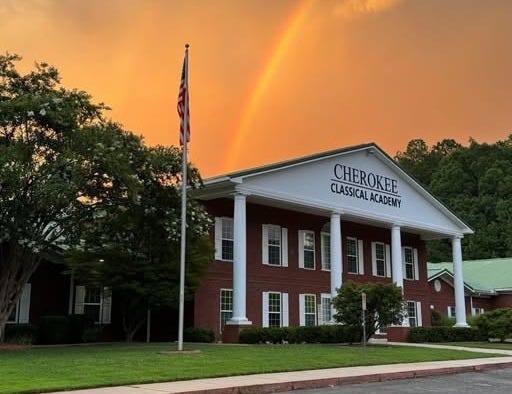

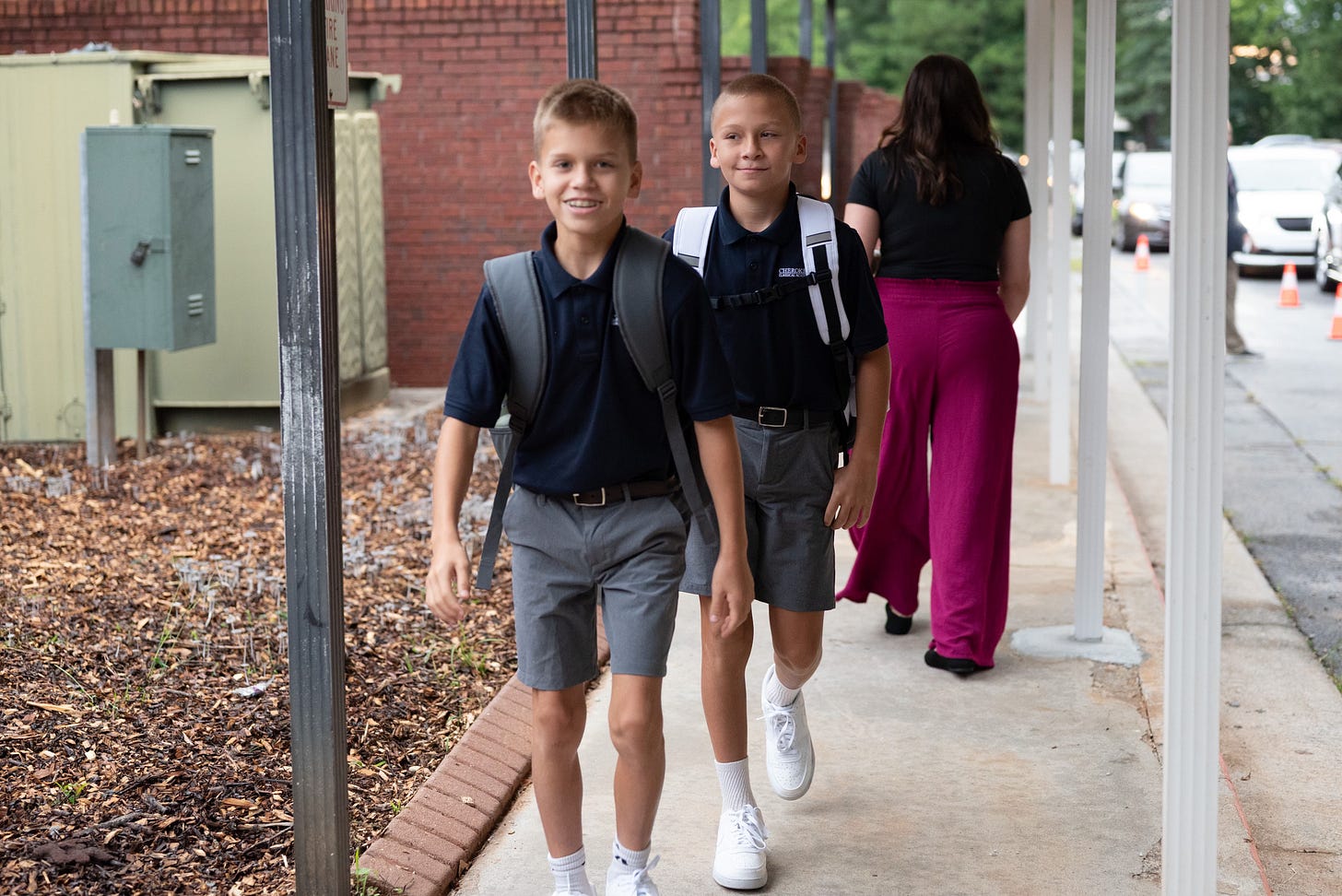
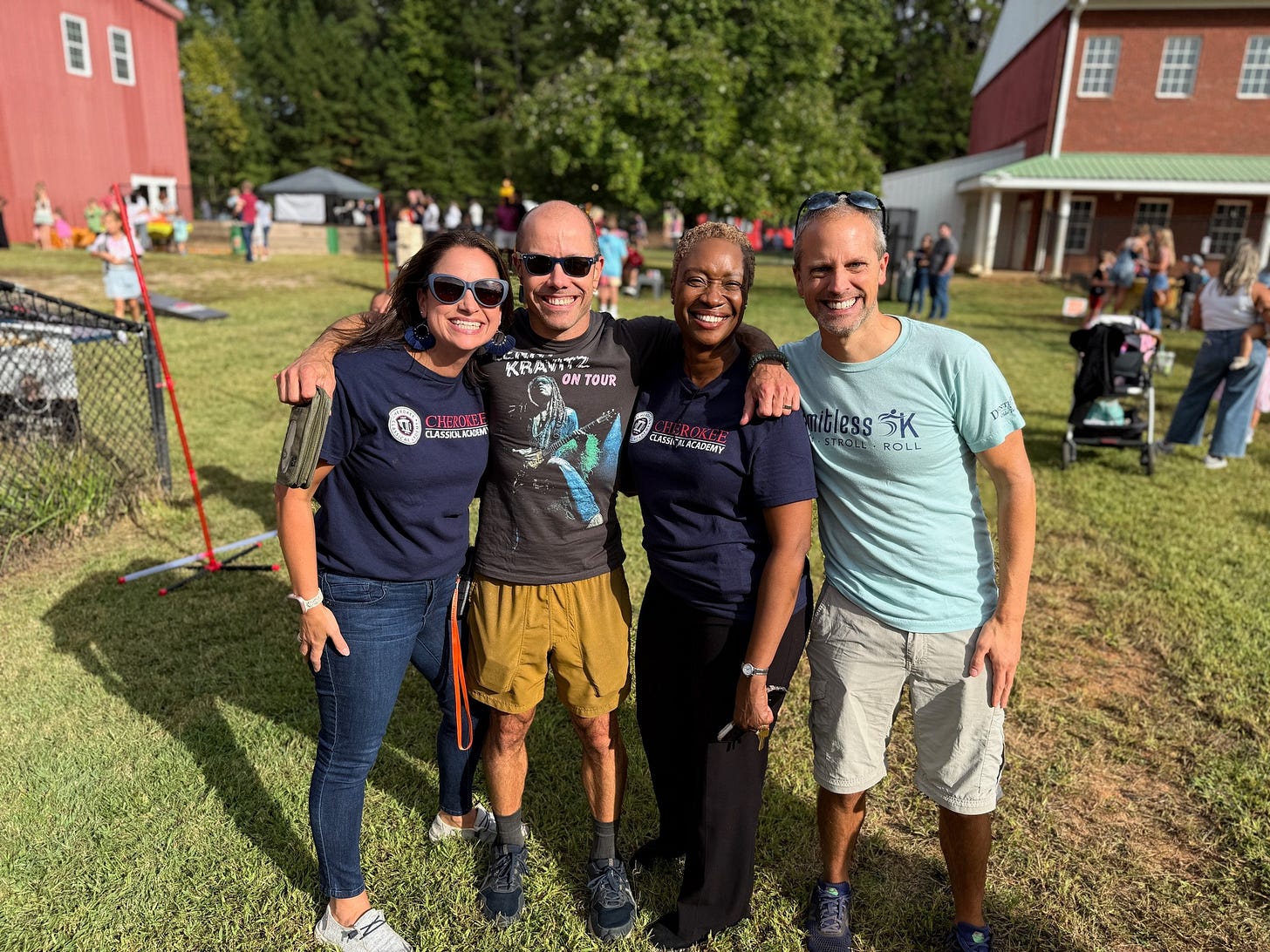
I could've written almost the exact same piece. You've captured things so well , Dan. Thanks for publishing this!